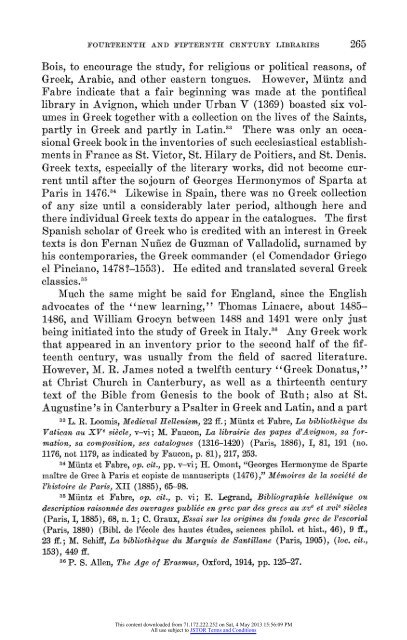The Intellectual Interests Reflected in Libraries of the Fourteenth and ...
The Intellectual Interests Reflected in Libraries of the Fourteenth and ...
The Intellectual Interests Reflected in Libraries of the Fourteenth and ...
You also want an ePaper? Increase the reach of your titles
YUMPU automatically turns print PDFs into web optimized ePapers that Google loves.
FOURTEENTH AND FIFTEENTH CENTURY LIBRARIES 265<br />
Bois, to encourage <strong>the</strong> study, for religious or political reasons, <strong>of</strong><br />
Greek, Arabic, <strong>and</strong> o<strong>the</strong>r eastern tongues. However, Mi<strong>in</strong>tz <strong>and</strong><br />
Fabre <strong>in</strong>dicate that a fair beg<strong>in</strong>n<strong>in</strong>g was made at <strong>the</strong> pontifical<br />
library <strong>in</strong> Avignon, which under Urban V (1369) boasted six volumes<br />
<strong>in</strong> Greek toge<strong>the</strong>r with a collection on <strong>the</strong> lives <strong>of</strong> <strong>the</strong> Sa<strong>in</strong>ts,<br />
partly <strong>in</strong> Greek <strong>and</strong> partly <strong>in</strong> Lat<strong>in</strong>.33 <strong>The</strong>re was only an occasional<br />
Greek book <strong>in</strong> <strong>the</strong> <strong>in</strong>ventories <strong>of</strong> such ecclesiastical establishments<br />
<strong>in</strong> France as St. Victor, St. Hilary de Poitiers, <strong>and</strong> St. Denis.<br />
Greek texts, especially <strong>of</strong> <strong>the</strong> literary works, did not become current<br />
until after <strong>the</strong> sojourn <strong>of</strong> Georges Hermonymos <strong>of</strong> Sparta at<br />
Paris <strong>in</strong> 1476.34 Likewise <strong>in</strong> Spa<strong>in</strong>, <strong>the</strong>re was no Greek collection<br />
<strong>of</strong> any size until a considerably later period, although here <strong>and</strong><br />
<strong>the</strong>re <strong>in</strong>dividual Greek texts do appear <strong>in</strong> <strong>the</strong> catalogues. <strong>The</strong> first<br />
Spanish scholar <strong>of</strong> Greek who is credited with an <strong>in</strong>terest <strong>in</strong> Greek<br />
texts is don Fernan Nunfez de Guzman <strong>of</strong> Valladolid, surnamed by<br />
his contemporaries, <strong>the</strong> Greek comm<strong>and</strong>er (el Comendador Griego<br />
el P<strong>in</strong>ciano, 1478?-1553). He edited <strong>and</strong> translated several Greek<br />
classics.35<br />
Much <strong>the</strong> same might be said for Engl<strong>and</strong>, s<strong>in</strong>ce <strong>the</strong> English<br />
advocates <strong>of</strong> <strong>the</strong> "new learn<strong>in</strong>g," Thomas L<strong>in</strong>acre, about 1485-<br />
1486, <strong>and</strong> William Grocyn between 1488 <strong>and</strong> 1491 were only just<br />
be<strong>in</strong>g <strong>in</strong>itiated <strong>in</strong>to <strong>the</strong> study <strong>of</strong> Greek <strong>in</strong> Italy.36 Any Greek work<br />
that appeared <strong>in</strong> an <strong>in</strong>ventory prior to <strong>the</strong> second half <strong>of</strong> <strong>the</strong> fifteenth<br />
century, was usually from <strong>the</strong> field <strong>of</strong> sacred literature.<br />
However, M. R. James noted a twelfth century "Greek Donatus,"<br />
at Christ Church <strong>in</strong> Canterbury, as well as a thirteenth century<br />
text <strong>of</strong> <strong>the</strong> Bible from Genesis to <strong>the</strong> book <strong>of</strong> Ruth; also at St.<br />
August<strong>in</strong>e 's <strong>in</strong> Canterbury a Psalter <strong>in</strong> Greek <strong>and</strong> Lat<strong>in</strong>, <strong>and</strong> a part<br />
33L. R. Loomis, Medieval Hellenism, 22 ff.; Mi<strong>in</strong>tz et Fabre, La biblio<strong>the</strong>que du<br />
Vatican au XVe siecle, v-vi; M. Faucon, La librairie des papes d'Avignon, sa formatwon,<br />
sa composition, ses catalogues (1316-1420) (Paris, 1886), I, 81, 191 (no.<br />
1176, not 1179, as <strong>in</strong>dicated by Faucon, p. 81), 217, 253.<br />
34 Mi<strong>in</strong>tz et Fabre, op. cit., pp. v-vi; H. Omont, "Georges Hermonyme de Sparte<br />
maitre de Gree a Paris et copiste de manuscripts (1476)," Memoires de la societe de<br />
l'histoire de Paris, XII (1885), 65-98.<br />
35 Mi<strong>in</strong>tz et Fabre, op. cit., p. vi; E. Legr<strong>and</strong>, Bibliographie hellenique ou<br />
description raisonnee des ouvrages publie'e en grec par des grecs au xve et xvie siecles<br />
(Paris, I, 1885), 68, n. 1; C. Graux, Essai sur les orig<strong>in</strong>es du fonds grec de l'escorial<br />
(Paris, 1880) (Bibl. de l'Neole des hautes etudes, sciences philol. et hist., 46), 9 ff.,<br />
23 ff.; M. Schiff, La biblio<strong>the</strong>que du Marquis de Santillane (Paris, 1905), (loc. cit.,<br />
153), 449 if.<br />
36<br />
P. S. Allen, <strong>The</strong> Age <strong>of</strong> Erasmus, Oxford, 1914, pp. 125-27.<br />
This content downloaded from 71.172.222.252 on Sat, 4 May 2013 15:56:09 PM<br />
All use subject to JSTOR Terms <strong>and</strong> Conditions

















